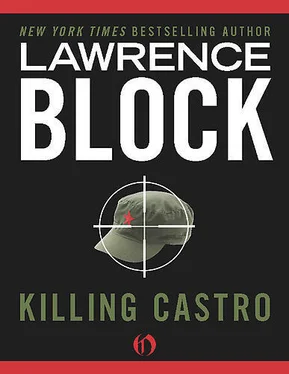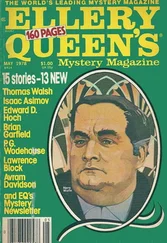But Batista was afraid, and had good reason to be. His answer was terror and repression, terror which had to be witnessed to be believed. His air force crossed the hills of Oriente time and time again, strafing fields at random on the off chance that rebels lay hiding there. His soldiers roamed Oriente, arresting peasants at will on charges of aiding Castro. Men and women were murdered. Peasants were tortured by the score in an attempt to gain information about Castro.
Terror was a poor weapon. Peasants who had given no thought to politics now saw Castro’s men on one side, brave and honest, paying for food and shelter. And on the other side were Batista’s mercenaries, taking what they wanted, looting, raping and slaughtering. These peasants listened to Castro’s promises of agrarian reform, heard him speak of liberty and freedom. The twelve ragged rebels grew in number. New recruits swelled their ranks, and peasants throughout Oriente were ready to feed and hide them from the government soldiers.
The spirit of rebellion which Castro had started in the hills soon spread to the cities. Underground cells sprang into being, harassing Batista’s men and gathering ammunition and supplies for the rebels in the east. A band of Havana students fearlessly attempted to assassinate Batista; the plot misfired and the assassins were machine-gunned outside the palace. The dictator grew increasingly desperate. His secret police made midnight arrests, and citizens vanished into jails and died there. Libertarian newspapers were suspended from publication. Their editors were tortured, murdered.
Castro could not be crushed. His men put the full techniques of guerrilla warfare into operation, striking, running and living to strike again. They sucked raw sugar cane to stay alive. They threw away their razors, vowing to remain unshaven until the revolution was a reality. The full beard became the emblem of liberty, and the public saw the barbudos —the bearded ones—as a new generation of freedom fighters, a race of supermen.
Batista’s wave of terror could not defeat Fidel Castro. The healthy revolution feeds on terror, thrives on it. Every act of repression wins support for the men who are fighting to overthrow the oppressor. Still, the terror of the dictator served a purpose.
It did not defeat Castro. But it began to change him.
It is not easy to fight a clean fight against an opponent who fights dirty. It is no simple matter to observe the Marquess of Queensberry rules in a contest with one who is trying to gouge your eyes and plant a knee in your groin. The temptation is always present to fight fire with fire, to greet terror with new terror.
Castro did this. There is still the question whether he ever intended to fight any other way. After all, many of his followers had been Communists for some time. Many of them had spent time in Russia and had learned Communist tactics there.
At the Sierra Maestro, Castro found a ranch foreman who had accused tenant farmers of being pro-rebel and who had greatly increased his personal land holdings at their expense. Castro’s men seized the foreman, tried him and executed him.
This was revolutionary justice.
Revolutionary justice. It was a fresh term, a new term, a carefully chosen rationalization for fighting fire with fire, for meeting the terror of Batista with the terror of the rebels. If Batista could torture and kill those who aided rebels, then Castro could leave the mutilated bodies of Batistianos as a grim souvenir of his purpose. If Batista could burn houses and slaughter peasants, Castro could go him one better and set sugar-cane fields afire and lay waste to thousands of acres of farmland.
If Batista could retreat into paranoia, seeing enemies on every side and leveling vengeful cries in every direction, Castro could adopt this paranoia and improve upon it. He, too, could reward those who followed him. And he, too, could swear eternal vengeance upon his enemies.
His movement was gaining ground; the ultimate success of his revolution was inevitable. But he himself was changing. Either that or he had been carefully hiding his real purpose all along.
The highway runs from Manzanillo, on the Gulf of Guacanayabo, almost due east to Santiago. Its course is roughly parallel to the southern coasts of Oriente Province, passing through the towns of Bayamo and Jiguani and Palma Soriano before reaching the end of the line. It is a broad, two-lane highway, paved with blacktop but maintained poorly. There are potholes here and there, the asphalt blacktop eroded or gouged out, and an automobile’s tires can take a beating on the road.
The land on either side of the road is rough and hilly. The soil is fertile and the rain plentiful, but this particular area is not good for the raising of sugar cane, the crop that is for Cuba what cotton was for the ante-bellum Southern United States. A little tobacco is grown here and there along the highway. Mostly, the land is given over to small truck-farms, or is abandoned to nature. There are hills, there are valleys, there are dense growths of shrubbery and brush.
There are also rebels.
It was late afternoon. Matt Garth lay flat on his back upon a threadbare army blanket and listened to the train. The train ran a zigzag course from Manzanillo to Glorieta in the east, bypassing Santiago. The train was now perhaps a mile from them, but it could be heard easily through the still air. It was the only sound audible.
Garth yawned and scratched himself. The spics were out somewhere, he thought. Out chasing fleas or something, for God’s sake. He didn’t know how in hell they did it, but every afternoon they went skulking off into the woods, and every night they came back with something to eat—a sack of beans, a pot of rice, a chicken with its neck twisted, a few eggs, once even a young pig taken too soon from its mother. Garth wasn’t too clear on how they managed it, whether they copped the food from farmers who were on their side or whether they just stole it. He didn’t much care.
He lit a cigarette, took two puffs on it and put it out.
He was going crazy, that was the trouble. He was going off his nut, roaming around in the goddamned mountains and eating rice and beans three times a day and waiting for something to happen. The fighting wasn’t bad but they hadn’t had any of that in too long, not since they cooked the six soldiers in the Jeep. Since then it was plenty of rambling, plenty of sleeping outside, plenty of goddamned beans and rice, and nothing else.
Oh, yeah. Plenty of the broad, that Maria, shaking those big tits and that hot ass right in his face, then pulling it all away the minute he got interested. The tease, the damn tease—she was driving him screwy. A girl who tossed it around like that ought to be ready to give some of it away. It would be a little better if she was at least putting out for somebody else. But not her, not that Maria bitch. She slept alone, slept by her goddamned self, and she stuck her tits in Garth’s face every other minute.
She was around now, he knew. She was over by the shore, scrubbing down pots and plates, oiling guns, making herself useful. And Fenton was around too, for all the goddamned good he was. Fenton, the punk, wasn’t doing him a hell of a lot of good. Fenton could speak English, all right, but Fenton still didn’t talk to him. He just sat around doing nothing all the time, maybe smoking a little, maybe talking to Manuel, the only spic who could speak English. Fenton talked to Manuel more than he talked to Garth, and Manuel never talked to Garth, and Garth couldn’t take it. He didn’t have leprosy, for God’s sake.
His mind started to work. Fenton was sitting by himself, doing nothing. And Maria was there, too. But if Fenton wasn’t around, if Fenton wanted to take a walk somewhere, then he would be alone with Maria. She was a tough bitch, tough as nails, but he was a man and he was sure one hell of a lot stronger than she was. So what if she screamed? Nobody would hear her. And what could she do later? Not a hell of a lot, because they needed him for the big play against Castro.
Читать дальше












